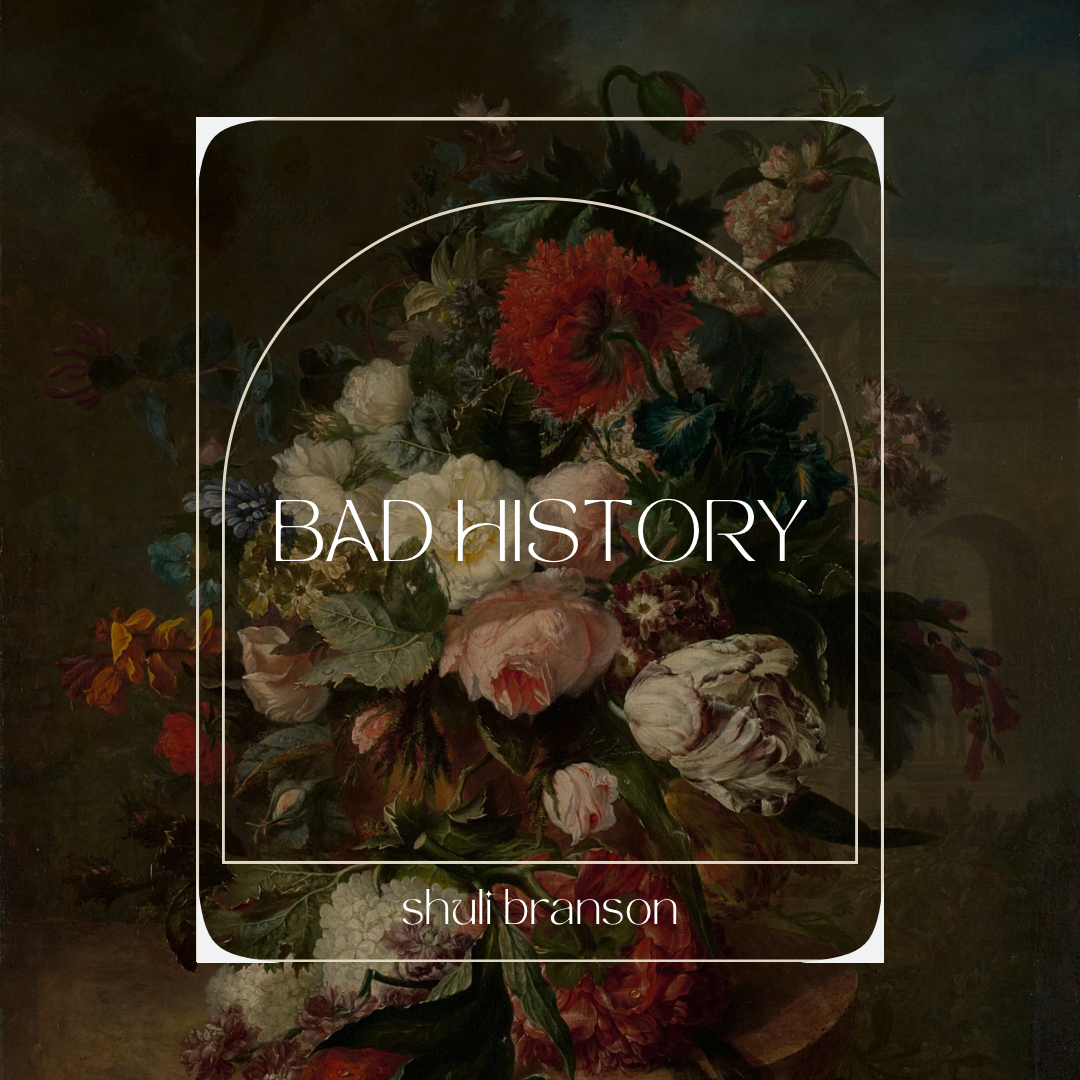Bad History

I wrote this before Luigi Mangione shot the CEO of United Healthcare. Such an act, totally unpredictable but ripping open the seams of this world to instantiate possibility in the present, is a beautiful act—not historical, since it breaks with this world and cannot be contained by time.
Why do we tell ourselves history? Why this pious agreement that being informed about history, along with politics, makes us somehow better, smarter, aware? As a Jew, I was raised under the sign of “Never Forget,” with the lesson that if we learn history, it won’t repeat itself. This lesson was taught with an emphasis on individual ethical obligation, as contained in the oft-repeated the Rabbi Hillel quote: “If I am not for myself, who is for me? And if I am only for myself, what am I? And if not now, when?” These questions outline autonomy and solidarity within the context of immediate action. Though these questions are of ancient provenance, I can hear them being uttered while the jackboots march down the street, and we knowingly face our inevitable destruction.
With all the remembering we’ve done—there is a whole industry of it—the history of European colonial genocide continues uninterrupted, stretching far back before the Nazis, and continuing to the present day with Gaza—perpetrated by the very Jews who swore to Never Forget. When Palestinians demand we remember the Nakba, instead of an echo of their own history, Israelis twist it into a projected logic of Nazism, all while using the very terms the Nazis did in perpetrating their holocaust. And for the rest of us in the West who were taught these lessons from history as a promise that when we witnessed it happening again we would not sit idly by like the “Good Germans”—well, even in our acts we have proven ineffective, drawn up into the ritual forms of protest and the promise of a vote for change.
Perhaps we know innately that these acts of killing are not the exception, but the rule, and we are thus predetermined to watch it unfold or turn our heads. Nothing can be done. And this happens even while a growing number of people in the US and elsewhere cry out about rising fascism: we shout and shout as we watch it get voted in, still hoping the lies of the system will ultimately protect us from the danger it enables, looking around for others to verify how terrible everything is and then we stand huddled together, seemingly powerless. Since WWII, 75 years, the US has moved from the apparent saviors of the Holocaust (ignoring the USSR) to an absorption of its logic, sometimes covering its exercise of deathly power with the veneer of liberal process and rule of law, sometimes speaking quite clearly its intentions to exterminate the brutes.
In Against His-story, Against Leviathan, Fredy Perlman tells the story of millennia of the inability to escape the state form tracing back to the Sumerians. In this story, people keep reforming the state with hopes of domination, or with hopes of finding liberation through it, only to witness the endless repetition of destruction and enforced labor. This endless repetition is mirrored in a quotation from Walter Benjamin’s essay on the concept of history that seems to find its way into every anarchist text: “Where we perceive a chain of events, [the angel of history] sees one single catastrophe which keeps piling wreckage and hurls it in front of his feet.” Against our sense of progress, the angel, facing backwards to the future, watches as “the pile of debris before him grows skyward.” Our cautions against repetition end up being another blindfold to create the illusion of linearity, lessons learned. But this pile of debris is no longer a line plotted on a continuum, like the tower of Babel it reaches towards the sky knowing full well it will get struck down. As Perlman tells it, the state has never been imposed without resistance, but its stickiness can suck that resistance up into its own voice, promising freedom by securing life against the unpredictable wilderness.
If history is tied to the state (and to the eruption of civilizations), then it is not the tool we need in order to free ourselves from this glue trap, an immobilization that forces us to watch as we are consumed through ideas of freedom. A certain Marxian idea of history uses the Hegelian dialectic to ensure that the march of history itself will result in communism, from originary or primitive forms of communism, through feudalism, towards industrialized capitalism, eventually ending in communism of an industrialized kind. In this version of history, the state doesn’t keep us stuck, and the modes of escape will come from the internal contradictions of the systems of domination. We can then take advantage of these contradictions, analyze their material possibilities in order to impose change for the better. Or else knowingly watch the crisis that is capitalism endlessly repeat, until that one last crisis tips it over.
There have been other liberatory tellings of history. Marcus Rediker and Peter Linebaugh use E.P. Thompson’s term “history from below,” and Howard Zinn names it a “people’s history”: these narrations prioritize the organizing and actions of people against forms of power, often a series of what-if moments when the wheels could have turned us in another direction, and yet over and over again these explosive moments are contained, usually through spectacles of death. But in hearing these stories, we can ostensibly trace lineages or find inspiration with the knowledge that there have always been people fighting back. We still end up with history as repeated defeat.
There are also anarchist attempts to use history to our advantage. Saralee Stafford and Neal Shirley take an insurrectionary angle in Dixie Be Damned, telling pockets of southern US history through the eruption of liberatory violence that breaks the social peace. They refuse any progress narrative, and they don’t tell these stories as what ifs. In fact, calling upon Benjamin, they see these moments of refusal as a “breaking with the current of productive time” (9-10). Insurrectionary action creates timeless moments of freedom, rupturing the fabric of civilization and affording a glimpse of the other life.
Stafford and Shirley call their work a “history of the present,” angling it towards an inspiration for now. If we are “part of a long arc of revolt” (13), then perhaps the linkage of these moments stands outside of time, itself a product of the prison state. In this view, time itself is the enemy, or at least an encumbrance, the waters of the river Lethe inducing forgetfulness: you cannot step in the same river twice. But are we then back to the beginning, another repetition, with the demand, Never Forget? I would rename the insurgence. We are no longer talking about history, but the collision of worlds, where something else erupts into the existing order.
In Warlike, Howling, Pure, Areïon offers a potential reframing of our relationship to the “past,” anarchism as ancestral lineage, a choice of inheritance performed in veneration of our ancestors. Anarchy is a flickering presence: “the eternal spirit of destruction-creation . . . always . . . with us and within us” (137). There is a simultaneous disposition towards anarchy—a welcoming of the spirit—and the spontaneous eruption of anarchy to break the chains of power. Anarchy is a force, anarchism a “set of traditions of thought and practice, sometimes crystallized into the form of ideology.” This vision is akin to how Catherine Malabou suggests we might think of anarchy. She quotes the filmmaker Tancrède Ramonet, who says that “one cannot say what anarchism is, one can only say that there is anarchism,” which Malabou glosses as “anarchism shows up/shows itself,” or “anarchism manifests.” In her phrasing in French, Malabou doesn’t write “l’anarchisme” but “de l’anarchisme,” pushing anarchism towards this undefinable multiplicity: there is some anarchy, something that cannot be contained.
Areïon pulls from an interview with James Baldwin to offer another view of history, what I want to call bad history. Faced with the “first-hand experience of his history repeating itself in the present” (89), Baldwin places himself both in the hold of the slave ship and in the position of the African selling slaves to Europeans. Seeming to reiterate the logic of Never Forget, Baldwin references “the crime that is committed until it is accepted that it was committed. If you don’t accept, if I don’t accept whatever it is I have done . . . I’m doomed to do it forever.” (90). But we may read this not as a claim on history, but rather on the ceaseless present; not time, but the endlessness of life, and in this space perhaps we may act.
As for history, Baldwin connects it to everyone’s implication in the continuation of the world built by crime: “we have to agree, too, that we both have produced, all of us have produced, a system of reality which we cannot in any way whatever control; what we call history is perhaps a way of avoiding responsibility for what has happened, is happening, in time.” This paradox—that we are all complicit in continuing to produce a system of violence and domination, and yet we do not have individual capability to end it—finds its false resolution in the form of history. Bad history, the one we are so used to invoking, is an alibi—history as a story told by no one; history that imposes time as a march forward standing in place, plotting endless repetition on a line stretching endlessly; history, which precedes us and follows us, existence projected past and future, so that, as time marches on, we can be relieved of the problem of thinking or better yet, acting.
History is an alibi for leftists and anarchists alike. We tell ourselves the stories of other struggles, not receiving wisdom and inspiration, but vicarious militancy. In the rapid progression of the spectacle, we consume history as entertainment, a narrative that allows us to cling to the now and its false comforts and protections while looking to the past as full of possibilities that we won’t admit are no longer possible. We are stuck desiring the Commune, Makhnovshchina, anarchist Spain, the Zapatistas, Rojava . . . but we are also stuck in the dynamics of the Cold War’s vision of the world. In the realm of realpolitik, leftists and anarchists alike still secretly believe in our impossibility, and like the deceived liberals, hold on to the two moments of US history that duped us into thinking of the possible beneficent state: the legendary New Deal post-depression, and the state version of the Civil Rights Movement or Johnson’s Great Society. Of course, we know consciously that these were moments of capture of more radical futures, but unconsciously we grasp for shreds of safety with horror at the net falling out; we face a blank wall of reproducing some of these basic necessities outside of state centralization and dispersed global production.
Our imaginations are fettered and we don't confront that honestly. We don't see the extent to which we are bound to this world, which produces an endemic fear of actual change, all wrapped up in our veneration of Bad History. Regardless of political positioning we take the wrong lessons out of history, usually to try to prove ourselves right, avoiding responsibility as Baldwin says. We recite traditions of people doing the work rather than imagining we have to make something up out of thin air, but when we grasp we still come up with nothing. History encircles us as we march in rounds because the leftisms we remain attached to, like most politics devolving from European enlightenment, only articulate themselves through universalisms (even when they say they don't) and there is no implementing that vision without violence.
We need a different resource of action, forgoing the leftist’s insistence on materialism, the liberal’s enshrinement of reason, and the militant’s worship of past glories. We can’t make bricks for them to use in the building of this corporate state: all the good things we have were stolen from us and sold back in withered form. Our projects get simulated and the threat is neutralized, most chillingly perhaps through the markers of identity, which turn our real concerns into political fodder and make us believe in a false liberation.
Nothing can prepare us for the action that slices through the fabric of time to usher in the present of anarchy. And our historical views mask the things we already do to build a world that either gets sucked up into the state of things or remains invisible out of misrecognition. As Areïon tells us, anarchy appears on its own accord; we can give it room, infuse ourselves with its spirit, maintain belief in the bizarre or the naïve or the magical. In this ecstasy we can admit that there are multiple timelines, and sometimes another world intrudes upon this world of horrors, shattering all sense of reality. Why not behave and believe in the boundlessness of our power, even if, in this world, it cannot take hold? We can invent rituals that unleash our wildness and pleasure, moments that spill over with threat and danger. And we can tell ourselves stories, myths—not history—that speak into existence what we want.





